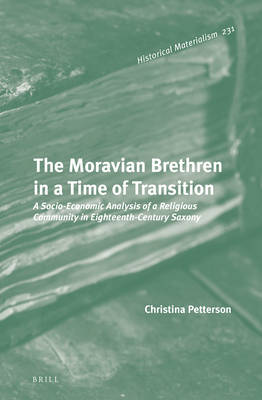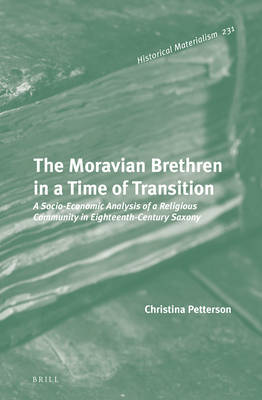
- Afhalen na 1 uur in een winkel met voorraad
- Gratis thuislevering in België vanaf € 30
- Ruim aanbod met 7 miljoen producten
- Afhalen na 1 uur in een winkel met voorraad
- Gratis thuislevering in België vanaf € 30
- Ruim aanbod met 7 miljoen producten
Zoeken
The Moravian Brethren in a Time of Transition
A Socio-Economic Analysis of a Religious Community in Eighteenth-Century Saxony
Christina Petterson
€ 329,95
+ 659 punten
Uitvoering
Omschrijving
Based on hundreds of archival documents, Christina Petterson offers an in-depth analysis of the community building process and individual and collective subjectification practices of the Moravian Brethren in eighteenth-century Herrnhut, Eastern Germany between 1740 and 1760.
The Moravian Brethren are a Protestant group, but Petterson demonstrates the relevance of their social experiments and practices for early modernity by drawing out the socio-economic layers of the archival material. In doing so, she provides a non-religious reading of categories that become central to liberal ideology as the Moravians negotiate the transition from feudal society to early capitalism. As such The Moravian Brethren in a Time of Transition combines archival analysis with socio-economic change.
The Moravian Brethren are a Protestant group, but Petterson demonstrates the relevance of their social experiments and practices for early modernity by drawing out the socio-economic layers of the archival material. In doing so, she provides a non-religious reading of categories that become central to liberal ideology as the Moravians negotiate the transition from feudal society to early capitalism. As such The Moravian Brethren in a Time of Transition combines archival analysis with socio-economic change.
Specificaties
Betrokkenen
- Auteur(s):
- Uitgeverij:
Inhoud
- Aantal bladzijden:
- 392
- Taal:
- Engels
- Reeks:
- Reeksnummer:
- nr. 231
Eigenschappen
- Productcode (EAN):
- 9789004319462
- Verschijningsdatum:
- 16/09/2021
- Uitvoering:
- Hardcover
- Formaat:
- Genaaid
- Afmetingen:
- 155 mm x 235 mm
- Gewicht:
- 774 g

Alleen bij Standaard Boekhandel
+ 659 punten op je klantenkaart van Standaard Boekhandel
Beoordelingen
We publiceren alleen reviews die voldoen aan de voorwaarden voor reviews. Bekijk onze voorwaarden voor reviews.








